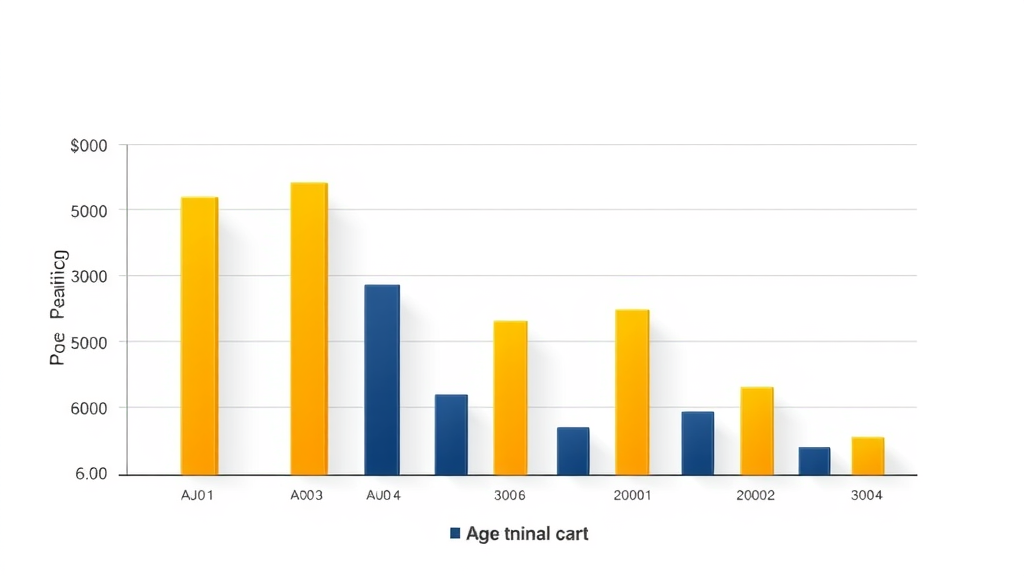- Did you know the average cost of a funeral in the U.S. now exceeds $8,000, leaving families vulnerable to sudden financial stress? Discover how final expense insurance can offer peace of mind and financial security for your family when it matters most.

When planning for the future, many families overlook one of life’s inevitable moments—end-of-life costs. Final expense insurance is designed to ensure your loved ones never face an unexpected burden when it's time to say goodbye. Funeral costs, medical bills, and other final expenses can quickly add up, sometimes overwhelming families who are unprepared. By understanding how final expense life insurance works, you can make informed decisions, compare the best policies, and give your family the financial relief and dignity they deserve.
- Key features and benefits of final expense insurance
- Critical costs covered by final expense policies
- Eligibility, underwriting, and payout details
- How to compare final expense insurance with traditional life or burial insurance
- Tips for selecting the best final expense insurance for your needs
Understanding Final Expense Insurance and How It Protects Your Loved Ones
- Clarifying final expense insurance, expense life coverage, and distinguishing between final expense and other life insurance policy types with practical examples.
Final expense insurance—sometimes called expense life insurance —is a unique form of permanent life insurance focused specifically on end-of-life costs. Unlike larger traditional life insurance policies, these are typically smaller-value policies meant to pay funeral costs, medical bills, and other immediate obligations after someone passes away. What sets final expense insurance apart is its straightforward application process and the assurance that your beneficiaries get funds—usually within days—to cover pressing expenses. For instance, while a standard life insurance policy may take weeks or even months to pay out, a final expense policy ensures loved ones can access funds when they are most needed.
People often confuse final expense life insurance with other types of policies, such as burial insurance or even term life coverage. However, there are distinct differences. Burial insurance is basically a nickname for final expense insurance, but some providers brand it specifically for funeral-related costs, whereas final expense can cover broader needs—unpaid bills, minor debts, or even memorial services. Unlike traditional life insurance policies, final expense policies are designed with simplicity in mind: smaller face amounts, easier qualification, and a fast death benefit payout that offers families immediate support during difficult times.
If you’re considering how these policies work in your specific state, it’s helpful to review local options and regulations. For example, those residing in Michigan can explore tailored coverage details and eligibility by visiting the Michigan Final Expense Insurance resource for state-specific guidance.
Why Final Expense Insurance is Essential: Avoiding Unexpected Financial Hardship
The Rising Cost of a Funeral and End-of-Life Medical Bills

The cost of a funeral is steadily rising, reaching an average of over $8,000 according to the National Funeral Directors Association. This figure doesn't just encompass the funeral director's fees; it includes everything from transportation and embalming to the casket, memorial service, and more. In addition to these expenses, families often face outstanding medical bills or final debts. Without adequate preparation, the shock of these financial demands can compound the emotional stress during a time of loss, sometimes resulting in families taking on debt or using critical savings to settle end-of-life costs.
Final expense insurance is specifically designed to address this reality, ensuring that your loved ones are not forced to make difficult decisions during a period of grief. Whether it's covering the cost of cremation, burial, a headstone, or simply assisting with unpaid utility bills left behind, a robust expense life insurance policy provides immediate help. This peace of mind is invaluable, allowing families to focus on remembrance rather than worrying about financial hardship.
Breaking Down the Death Benefit: How Loved Ones Are Supported
The cornerstone of every final expense policy is the death benefit —a tax-free lump sum paid directly to your chosen beneficiaries. Unlike the process with some traditional life insurance policies, which can be slow and bureaucratic, final expense insurance products are designed to deliver funds swiftly. This immediate cash can be used for funeral arrangements, legal costs, or to settle outstanding debts, ensuring your family has the freedom and dignity they need to grieve and honor your wishes.
The typical death benefit ranges from $5,000 to $25,000. Beneficiaries have flexibility in how the payout is used; while many apply it to funeral or burial expenses, others might use it to address mortgage payments, clear lingering medical bills, or maintain daily living standards in the weeks after a loved one's passing. This financial relief can make an incredible difference, helping families avoid sudden debt, high-interest loans, or loss of inherited assets.
Types of Final Expense Insurance Policies Explained
Simplified Issue vs. Guaranteed Issue Final Expense Policies

There are two primary types of expense life insurance most frequently offered to seniors: Simplified Issue and Guaranteed Issue final expense policies. A simplified issue policy typically requires a brief health questionnaire, but no full medical exam . This means even those with health issues can often qualify, though certain conditions may impact eligibility or premium rates. These policies generally offer slightly lower premiums as risk is partially assessed.
In contrast, guaranteed issue policies require no questions about health and absolutely no medical exam —virtually anyone in the qualifying age range can be accepted regardless of their health status. However, these policies tend to have higher premiums and sometimes include a waiting period before the full death benefit is available. Both types ensure your coverage amount is guaranteed as long as premiums are paid, giving families predictable, dependable support.
Expense Life Insurance vs. Burial Insurance: Key Differences
There’s often confusion between burial insurance and expense life insurance . Both are designed to cover end-of-life costs, but the terms are sometimes used interchangeably by insurance companies. Typically, burial insurance refers specifically to policies matched to the cost of a funeral, headstone, and related expenses. Expense life insurance, on the other hand, is broader: it can pay for medical bills, outstanding debts, or even legal fees and living expenses after someone passes away.
The key to finding the right policy is understanding what you need covered. If your primary concern is the direct cost of burial , burial insurance may be sufficient. However, if you foresee a need to cover additional financial responsibilities, a comprehensive final expense insurance policy is usually a better fit.
How Final Expense Life Insurance Complements Traditional Life Insurance
Many people assume that a standard life insurance policy is enough, but it’s worth recognizing how final expense life insurance can complement or even improve your overall planning. Term life and whole life policies are suitable for replacing income or leaving a legacy, but their face value may not always be liquidated promptly after death. Final expense policies, by comparison, deliver smaller payouts quickly, bridging the gap for immediate costs while executors and family members sort through larger estates.
For example, a family with an existing traditional life policy but no accessible cash may struggle to pay the funeral director or settle urgent medical bills. By adding an expense policy specifically designed for these needs, loved ones receive prompt funds for pressing expenses, safeguarding family wealth and providing comfort during a difficult transition.
| Policy Type | Typical Face Amount | Medical Exam Required? | Payout Speed | Main Purpose |
|---|---|---|---|---|
| Final Expense Insurance | $5,000–$25,000 | No | 1-2 weeks | End-of-life costs, funeral, bills |
| Expense Life Insurance | $5,000–$25,000 | Rarely | Fast | Broad end-of-life expenses |
| Burial Insurance | $5,000–$15,000 | No | Quick | Funeral and burial costs |
| Term Life Insurance | $50,000–$1,000,000+ | Often | Weeks | Income replacement, debts |
How Final Expense Insurance Works: Premiums, Medical Exams, and Application
Who Qualifies for Final Expense Insurance: Age, Health, and No Medical Exam Needs

One of the biggest advantages of final expense insurance is its accessibility. Most policies are available to individuals aged 50 to 85, though some carriers extend coverage up to 90. Medical history or current health can influence the exact type of policy you’ll qualify for, but many do not require a medical exam. This low barrier to entry makes expense life insurance especially popular among seniors or those managing pre-existing conditions. Guaranteed acceptance policies allow nearly everyone to qualify, even those who may have been turned down for other types of life insurance .
It’s important to review qualifications and ask your agent about any restrictions on age or payout for your chosen insurance policy . Comparing plans ensures you get the best coverage amount and rate for your situation, without surprises down the line.
Understanding the Application: Filling Out an Insurance Policy and Getting Approved
Applying for final expense insurance is designed to be rapid and uncomplicated. Usually, it involves filling out a short application form, answering limited health questions (for simplified issue), and providing basic details like income, desired coverage, and beneficiary information. Most applicants receive a decision within days—in many cases, on the same day if applying digitally. You won’t typically require a medical exam, and most forms are processed entirely online or over the phone.
Once your application is approved and your first premium payment is received, your final expense policy becomes active. Your loved ones can then rely on the policy’s death benefit when the time comes. Keeping paperwork organized and notifying family of your policy ensures a smooth claims process, preventing any payment delays at a difficult time.
Assessing the True Value: Is Final Expense Insurance a Good Deal for You?
Calculating the Death Benefit: How Much Coverage Is Enough?

Determining your ideal death benefit starts with making a list of the expenses your family might face. These could include the average cost of a funeral, outstanding medical bills , and other debts such as credit card balances or utility costs. Using a simple final expense estimator calculator, tally up these anticipated expenses and add an additional buffer for unforeseen obligations. If your area’s average funeral cost is $8,000 and your debts total $2,000, a $10,000 final expense policy may provide sufficient security.
Always remember: It’s better to slightly overestimate than to leave your family short on funds. Factoring in inflation or changes in the local cost of a funeral ensures the coverage amount meets actual needs.
Weighing the Long-Term Cost of a Final Expense Policy vs. Traditional Insurance Policies
On a per-dollar basis, final expense insurance premiums are generally higher than those for term life insurance, because these policies are designed for accessibility and immediacy of payout, rather than maximum long-term returns. For seniors who don't require large face amounts, this tradeoff can make sense. The guaranteed acceptance and quick approval process often outweigh the extra premium costs for policyholders who may not qualify for other life insurance policies or who desire immediate peace of mind.
If you’re younger and in great health, traditional term life policies may be more cost-efficient for the coverage amount. However, for those prioritizing quick, dependable funds for specific end-of-life costs, final expense coverage provides a safety net that protects your family from facing sudden debts or being forced to dip into emergency savings.
“Peace of mind has no price tag—final expense insurance ensures that legacy means comfort, not burden.”
How Much Does Final Expense Insurance Cost? Breaking Down Premiums
Average Price for Final Expense Insurance in 2024: Age, Gender, and Coverage Amounts

Premiums for final expense life insurance policies depend on three key factors: age, gender, and the coverage amount you select. In 2024, adults in their 50s can expect to pay around $30 to $40 per month for a $10,000 policy, while those in their 70s see higher rates, often in the $60 to $100 range due to increased risk. While women generally pay slightly less, these policies remain within reach for retirees—even those with moderate health complications.
Most policies grant lifetime fixed premiums, meaning costs won’t go up as you age. This predictability allows for better budget planning, ensuring families are always protected regardless of when the policy is eventually needed.
Factors That Influence Expense Insurance Premiums
Several variables impact what you’ll pay for expense insurance . Your age at application is the most important—waiting to apply can result in higher monthly costs. Health profile, tobacco use, gender, desired coverage amount , and policy type (simplified vs. guaranteed issue) all play a role. Some insurers offer discounts for non-smokers or loyalty bonuses for long-term payment history.
Choosing the smallest face amount needed to cover anticipated final expenses keeps your premiums manageable. Shopping around and comparing quotes from multiple insurance companies ensures you land the best deal for your circumstances.
| Age Group | Female (Non-Smoker) | Male (Non-Smoker) | Female (Smoker) | Male (Smoker) |
|---|---|---|---|---|
| 50–59 | $30–$35 | $35–$40 | $38–$45 | $45–$50 |
| 60–69 | $38–$45 | $45–$54 | $52–$62 | $61–$73 |
| 70–79 | $55–$67 | $64–$78 | $80–$94 | $95–$110 |
Sample Quotes and Real-World Pricing Scenarios
Imagine a 65-year-old female non-smoker purchasing $15,000 in coverage—her monthly premium would range from $48 to $62, depending on the carrier and state of health. For a 75-year-old male smoker, a $10,000 guaranteed issue policy might run $95 per month. Comparing multiple quotes ensures you find the premium, payout, and policy structure best suited for your family’s needs.
“For many seniors, final expense insurance offers accessible protection, often with no medical exam needed.” – Insurance Specialist
Top Features to Look for in Final Expense Insurance Policies
- Death benefit flexibility and payout speed
- Ease of qualification—no medical exam
- Guaranteed premiums and coverage amounts
- Additional riders: accidental death, living benefits
- Customer service and claims support reputation

When assessing final expense insurance policies , look for plans that offer rapid death benefit payouts, minimal barriers to qualification, and options for adding riders such as accidental death or living benefits. Ensure premiums are fixed for life, not subject to increasing as you age. The best insurers also boast strong customer reviews and streamlined claims processes, ensuring your beneficiaries aren’t left waiting.
Additional policy features like digital applications, grace periods for late payments, or access to online policy management can make life easier for both you and your family. Before purchasing, confirm that the provider explains all features and fine print to guarantee your peace of mind.
Comparing Final Expense Insurance Companies and Policies
Best-Rated Final Expense Life Insurance Providers in 2024
In 2024, top-rated carriers for final expense life insurance include household names like York Life, Company B, and Company C. York Life is often highlighted by financial experts for its balance of competitive premiums, policy options, and excellent customer satisfaction. Leading companies stand out by offering digitally streamlined applications, fast claims payments, and additional features like no waiting periods for immediate coverage on some expense policies.
The most reliable carriers have a strong national reputation, high financial ratings, and a history of transparent communication with clients. Reading reviews and checking independent industry ratings can provide key insights into claims processing speed and overall client experience.
Features, Pros, and Cons: Expense Policies from Leading Carriers
Each insurance company offers distinct benefits. Some focus on quick policy issuance with no questions asked, ideal for applicants with health challenges. Others provide higher maximum death benefits or additional customizable policy riders. However, faster and more flexible qualification may come with a higher premium, so always weigh your priorities and run multiple quotes.
Consider customer service, claims support, and the insurer’s reputation with the National Funeral Directors Association as part of your research, ensuring your family receives prompt and respectful support.
| Company | Key Features | Pros | Cons |
|---|---|---|---|
| Company A (York Life) | No medical exam, fixed premiums, fast payouts | Competitive rates, reliable claims, wide availability | Face amount cap may be lower than some competitors |
| Company B | Larger death benefit options, living benefit riders | Higher maximum coverage, additional benefits | Stricter qualification questions, slightly higher premiums |
| Company C | Digitized application, top customer ratings | Ease of process, streamlined online tools | Limited policy add-ons |
- Company A: Competitive premiums, no medical exam, fast payouts
- Company B: Larger death benefits, additional policy riders
- Company C: Digitized applications, excellent customer ratings

How to Buy Final Expense Insurance: Steps to Secure Your Policy
Checklist: Essential Questions to Ask Before Purchasing an Expense Policy

- What coverage amount best fits my family’s needs?
- Will the policy pay out quickly for final expenses?
- Are premiums guaranteed not to increase?
- Is a medical exam required for approval?
- Does the insurer have a strong reputation and positive customer service reviews?
Answering these key questions before purchasing helps ensure your final expense policy is tailored to your family’s unique circumstances and remains reliable for years to come.
Required Documents and the Application Process
To complete your application, be prepared with your government-issued ID, Social Security number, current health details (for simplified issue policies), and basic financial information. Most insurers streamline the process, allowing you to submit necessary documents and finalize your application online or over the phone, sometimes in under 30 minutes. Always double-check for any paperwork needed for eligibility and inform your beneficiaries so they know how to make a claim.
After submitting your application, you’ll receive a policy contract outlining premiums, death benefit, and other terms. Carefully review all documents with a trusted advisor or family member before signing—this step ensures your coverage is accurate and fully meets your expectations.
Policy Review: Scheduling Regular Check-Ups on Your Final Expense Life Insurance
Life changes—review your policy regularly, especially after major life events (marriage, moving, changing family size) to confirm your coverage amount is still appropriate. Final expense insurance isn’t a set-it-and-forget-it decision; an annual check-up helps guarantee your legacy, coverage, and peace of mind are always in good order.
Reach out to your insurer or agent at least once a year to update beneficiaries, confirm premium payments are up to date, and review any possible new benefits or policy riders.
Common Myths About Final Expense Insurance Debunked
- Myth: Final expense policies are always more expensive than traditional life insurance
- Myth: Payouts can only be used for funeral expenses
- Myth: You won’t qualify due to health issues
While final expense insurance can sometimes carry higher premiums per dollar than certain term life policies, its accessibility, flexibility, and guaranteed payout can be far more valuable—especially for those who may not qualify for other policies. Payouts are not restricted only to funeral costs; they can be used for any immediate end-of-life expense your family faces. Finally, many policies have no health requirements, opening the door for coverage to nearly anyone.
People Also Ask
What is the final expense insurance?
- Final expense insurance is a type of permanent life insurance designed to cover end-of-life costs, such as funeral expenses, medical bills, and outstanding debts. It provides a lump sum death benefit paid directly to beneficiaries, ensuring loved ones are not financially burdened by these expenses.
Is final expense insurance a good deal?
- For many seniors and those without significant savings, final expense insurance is a practical way to cover inevitable costs. While premiums may be higher per dollar of coverage than some term life options, the easy approval process and guaranteed payout offer substantial value and peace of mind.
What are the disadvantages of final expense insurance?
- Disadvantages include lower death benefits compared to other life insurance policies, potentially higher premium costs per $1,000 of coverage, and the risk of outliving the policy’s value if premiums exceed the actual payout needed.
What is the average price for final expense insurance?
- The average monthly premium for final expense insurance varies by age, health, and coverage amount, but typically ranges from $30 to $70 per month for older adults purchasing $10,000 to $20,000 in coverage.
Frequently Asked Questions about Final Expense Insurance
- Who is eligible for expense life insurance? Most people ages 50–85 are eligible for final expense life insurance, with options for those in poor health or requiring no medical exams.
- Can final expense policies be denied due to health issues? Guaranteed issue policies accept nearly all applicants, regardless of health. Some simplified issue plans may deny based on recent serious health conditions.
- Is burial insurance the same as final expense insurance? Burial insurance is a common term for final expense insurance focused on funeral costs, but final expense can cover broader end-of-life bills.
- What does a final expense policy cover beyond funeral costs? Policies can also pay medical bills, outstanding personal debts, utility payments, and more.
- Are premiums fixed or do they increase with age? Most final expense policies feature fixed premiums that remain the same for life as long as payments are maintained.
Essential Takeaways on Final Expense Insurance for Protecting Your Family
- Final expense insurance provides essential financial protection, shielding loved ones from unexpected end-of-life costs.
- It is accessible, flexible, and can be tailored to your unique needs—even for those in poor health.
- Comparing expense life insurance options helps secure the best coverage at an affordable price.
- Planning ahead with final expense life insurance ensures your family’s peace and dignity are preserved.
Ready to Secure Peace of Mind? Get a Final Expense Insurance Quote Today
- Don’t leave your loved ones with unmanageable expenses. Compare leading final expense insurance plans, review pricing, and secure lasting peace of mind. Contact us today for your personalized consultation and quote.
Take action now: Protect your family and ensure your financial legacy brings comfort, not burden—request your custom final expense insurance quote today.
As you take steps to secure your family’s future, remember that every state has its own nuances when it comes to final expense planning. If you’re located in Massachusetts, you can gain even deeper insight and personalized recommendations by exploring the Massachusetts Final Expense Consultation page. There, you’ll find expert guidance on local regulations, policy options, and strategies to maximize your coverage. Whether you’re just starting your research or ready to fine-tune your plan, leveraging state-specific expertise can help you make the most informed and confident decisions for your loved ones’ peace of mind.
Final expense insurance is a type of whole life insurance designed to cover end-of-life expenses, such as funeral costs, medical bills, and outstanding debts. Unlike traditional life insurance policies, final expense insurance typically offers lower coverage amounts, ranging from $2,000 to $50,000, making it more affordable and accessible, especially for seniors or individuals with health concerns. ( newyorklife.com )
Key Features and Benefits of Final Expense Insurance:
-
No Medical Exam Required: Many final expense policies do not require a medical examination, simplifying the application process and making it easier for individuals with pre-existing health conditions to obtain coverage. ( transamerica.com )
-
Fixed Premiums: Premiums remain consistent throughout the life of the policy, providing predictable financial planning without the worry of increasing costs as you age. ( aflac.com )
-
Cash Value Accumulation: Over time, these policies can build cash value, which policyholders can borrow against if needed, offering additional financial flexibility. ( aflac.com )
-
Flexible Use of Death Benefit: Beneficiaries can use the death benefit for any purpose, including funeral expenses, medical bills, or other financial obligations, providing them with the flexibility to address their most pressing needs. ( newyorklife.com )
Comparing Final Expense Insurance with Traditional Life Insurance:
While both final expense and traditional life insurance provide financial support to beneficiaries, they differ in several aspects:
-
Coverage Amounts: Traditional life insurance policies often offer higher death benefits, suitable for income replacement and long-term financial planning, whereas final expense insurance focuses on covering immediate end-of-life costs. ( aflac.com )
-
Premium Costs: Due to the smaller coverage amounts, final expense insurance premiums are generally lower, making it a cost-effective option for those primarily concerned with covering funeral and related expenses. ( aflac.com )
-
Eligibility and Underwriting: Final expense insurance typically has a simplified underwriting process with no medical exams, making it accessible to a broader range of individuals, including those with health issues. ( transamerica.com )
Is Final Expense Insurance Right for You?
Final expense insurance is particularly beneficial for individuals who:
-
Do not have sufficient savings to cover end-of-life expenses.
-
Are ineligible for traditional life insurance due to age or health conditions.
-
Wish to ensure their loved ones are not burdened with funeral costs and other final expenses.
However, if you have substantial savings or existing life insurance coverage that can address these costs, a final expense policy may not be necessary. ( investopedia.com )
Conclusion:
Final expense insurance offers a practical solution for covering end-of-life expenses, providing peace of mind that your loved ones will not face financial hardship during a difficult time. By understanding its features and comparing it with other life insurance options, you can make an informed decision that best suits your financial planning needs.
 Add Row
Add Row  Add
Add 




Write A Comment